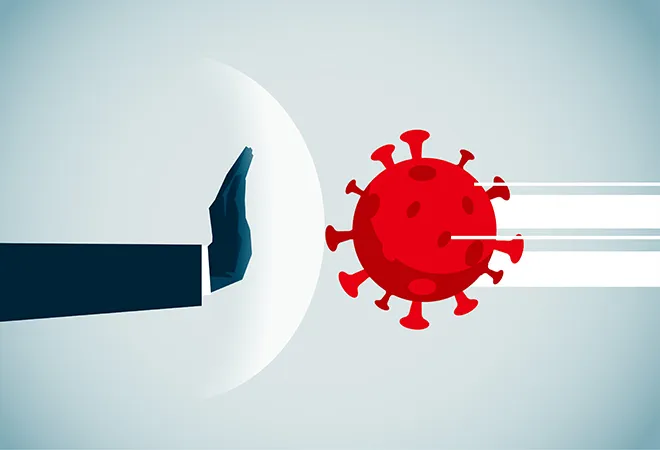The mundane imagery of politics largely invokes scepticism and suspicion in the public imagination. And such cynical perception of everyday politics is probably based upon a legit premise of perpetually witnessing the perversion of the political discourse. And political trajectory in India is also not immune to such an insidious decay and hence a vitiated public opinion of politics has almost turned banal.
When such a fatalistic assessment of the irreversible erosion of politics became a commonplace in Indian politics riding on the perils of communalism, corruption, nepotism, majoritarianism, calumny, vilification and deception, the outbreak of a gargantuan health crisis in the form of COVID19 seems to have interrupted the monotony of dysfunctional and polarised politics, albeit in a limited way. Notwithstanding the temporariness and urgency of this extraordinary situation, the multilayered political communication from all levels of the Indian leadership makes this moment worth noting in two fundamental ways.
First, the outbreak of the pandemic has witnessed the rise of the regional leaders in the respective States as primary communicators in order to prevail upon the emergency situation and take stock of the bludgeoning health crisis, especially as the health remains in the jurisdiction of the State list.
Second, the unfolding of a crisis which is not only mammoth in its magnitude but also is completely unprecedented in nature, demanded a message underlining a conciliatory and united response between centre and the states which has been in display to some extent as of now.
Regional moment
The constitutional setting that puts the jurisdiction of healthcare in the hand of the States and the practical imperative of localised response to the crisis, made the political communication at the regional level extremely important. The regional leaders like Mamata Banerjee in West Bengal, Uddhav Thackrey in Maharashtra, Arvind Kejriwal in Delhi, Pinarayi Vijayan in Kerala, Naveen Patnaik in Orissa and other State leaders seemed to have sprung into action in which their political communication became extremely crucial on two levels.
First, their constant communication with the people through regular press conferences in which they were found taking upon the role of an educator by touching upon crucial issues like making the people aware of newly introduced (for many) terms as social distancing and quarantine in lucid language and giving demonstrations on how to remain safe during the epidemic. Mamata Banerjee’s visits to the markets in Kolkata in order to give in-person demonstrations of practicing social distancing to the vegetable vendors are a case in point.
The chief ministers’ repeated communication with the lower echelons of the administration as well as hospital authorities for constant and speedy mobilisation of the resources and assistance is also instrumental in keeping up the morale of the people who are spearheading the struggle against the crisis at many levels.
Moreover, the constant assurances given by the respective State leaders regarding the availability of essential commodities and the announcement of the protection and welfare measures for the poor and vulnerable affected by the contingency, has also appeared to be a succour to the people. Second, the chief ministers’ repeated communication with the lower echelons of the administration as well as hospital authorities for constant and speedy mobilisation of the resources and assistance is also instrumental in keeping up the morale of the people who are spearheading the struggle against the crisis at many levels.
Also, the unusual alacrity with which the State governments have responded in checking the excesses committed by their police in order to forcibly enforce the lockdown, is also something beyond the idel conduct of everyday politics. Lastly, a slew of welfare measures for the vulnerable and marginalised, especially for the homeless and jobless migrant workers struck in the middle of the lockdown is also unprecedented and unbecoming of the usually indifferent demeanour that the administration have towards the socially and economically oppressed lot.
However, this is not to argue that such an extraordinarily rapid response and communication from the State leadership is bereft of hiccups and limitations. And, one should also be caution in order to wait and see how much of such an impression of preparedness would actually percolate at the ground level and make real impact, given the limited public health care infrastructure, the Indian states (with relative variations) have.
Call for cooperation
Coming close to the heels of the response of the State governments in respective provinces, the central leadership and the Prime Minister has taken up the role of a coordinator of overall assessment and a moral support giver in the light of the pandemic. In a rare occasion of displaying the spirit of shared responsibility and cooperative federal arrangement, the Centre and the States are constantly coordinating with each other and working in tandem to face the crisis in an effective way.
It is true that some States have complained regarding Union Government’s lack of rapid response in channelising medical kits, relief packages and other amenities, such grievances have been addressed in a formal policy framework of technical assistance and has received minimum politicisation from both the Centre and the States. Prime Minister Modi, who is usually known for his predilection towards taking the centre stage in the light of all other national issues, have been uncharacteristically seen as limiting his role in according a moral support for just galvanising the national solidarity in battling the crisis apart from announcing the nation-wide lockdown and by coordinating the crisis management by playing a guiding and supervisory role with the States by complimenting their responses and asking suggestion from them to tackle the crisis.
Innovative political interventions that can support the weaker states to commensurately deal with the crisis by being at par with the more resourceful States, is the need of the hour that the national leadership must most seriously ponder over.
However, the Central Government’s role in general and the Prime Minister’s role in particular in battling the crisis has been criticised for the lack of or delayed substantive welfare measures. Moreover, the PM who is otherwise seen to be a vivid communicator addressed the nation during the crisis in the nature which has largely been seen as high on symbolism and bereft of substantive assurances of relief. Innovative political interventions that can support the weaker states to commensurately deal with the crisis by being at par with the more resourceful States, is the need of the hour that the national leadership must most seriously ponder over.
Potential for ‘good politics’?
However, on one hand, it is an absolute no brainer to understand that the political response to the crisis should have been and has to be far more assuring and effective on ground in order to mitigate the contingency in real terms at all levels. However, on the other hand, as one usually lingers in the perennial despondency of vitiated discourse of everyday politics, any ray of hope that gives an opportunity to reinforce the reparative potential of politics must be registered, albeit with adequate caution.
It is not to argue that such a symbolic show of energised and nuanced communication on the part of the regional leaders and the restrained demeanour of the central leadership, is a harbinger of some utopian spasm of ‘good politics.’ But this unique hiatus of thoughtful political communication, free from usual apathy or mud sling, can be perceived as the slightest reminder of the potential of the political dispensation that a contingency can bring about to the surface, even if only for the sake of political expediency and imprimatur.
This commentary originally appeared in South Asia Weekly.
The views expressed above belong to the author(s). ORF research and analyses now available on Telegram! Click here to access our curated content — blogs, longforms and interviews.




 PREV
PREV


